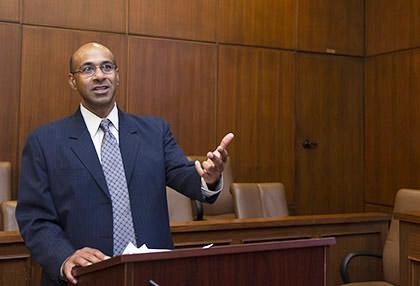Arulanantham Delivers Oral Argument at the Supreme Court

UCLA School of Law Professor from Practice Ahilan Arulanantham presented oral argument before the U.S. Supreme Court on Nov. 8 in the case of FBI v. Fazaga.
Arulanantham is faculty co-director of the Center for Immigration Law and Policy at UCLA Law. Among the nation’s leading advocates for immigrants’ rights, he joined the law school in 2020 after a long tenure as senior counsel at the ACLU of Southern California, where he represented clients in several landmark immigration cases.
This was his third argument at the Supreme Court.
In Fazaga, Arulanantham advocated on behalf of Sheikh Fazaga, Ali Malik and Yasser AbdelRahim; three Muslim Americans who were secretly surveilled by the FBI because of their religious beliefs in 2006 and 2007, while living in Orange County, California. His presentation centered on the argument that the Plaintiffs’ religious freedom claims should be allowed to proceed. A lawyer for the government disagreed, arguing that the religious freedom claims should be dismissed because, to defend itself, the government would have to disclose information about the operation, that would put national security at risk, even if disclosed only to the judge in camera.
Attorneys on both sides of the matter endured sharp questioning from the justices during the two hours of oral argument. “This case is entirely about dismissal based on [the government’s] need to use secret information to defend themselves,” Arulanantham said in the opening portion of his remarks. The Foreign Intelligence Surveillance Act, he continued, allows for a judge to review potentially sensitive information before a case is dismissed for national security reasons.
The Supreme Court is expected to issue its decision in the case before its term ends next year.
To prepare for his appearance before the high court, Arulanantham — who is also a former assistant federal public defender and MacArthur Foundation Fellow — relied on the advice and expertise of many members of the UCLA Law community. Several faculty members participated in moot courts, including one that took place before an audience of students, where he practiced his oral argument.
During the law school’s 20th Whither the Court presentation on Sept. 29, Arulanantham shared some of his thoughts about FBI v. Fazaga. “[This case] is extraordinarily important for several reasons,” he said. “It’s a chance to hold the government accountable for discrimination that has gone on ubiquitously against Muslim Americans for the last 20 years. It’s also very important for people interested in NSA spying and other sorts of mass warrantless surveillance.”
Listen to the full audio of Arulanantham’s oral argument in the Supreme Court or read the transcript.
Watch the 20th Whither the Court presentation on UCLA Law’s YouTube channel.